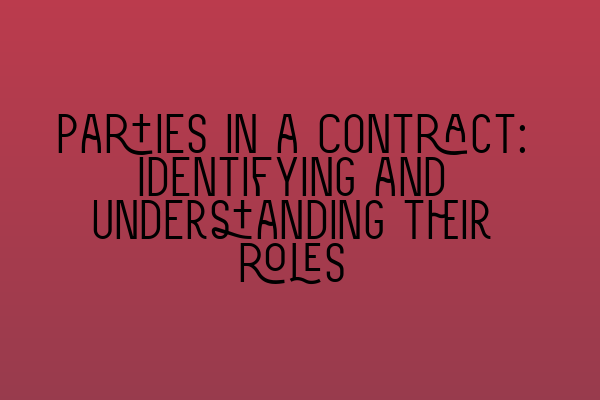Parties in a Contract: Identifying and Understanding Their Roles
When it comes to contract law, understanding the roles of the parties involved is crucial. The parties in a contract are the individuals or entities that enter into a mutual agreement, and each party has specific rights and responsibilities. In this article, we will explore the importance of identifying and understanding the roles of the parties in a contract.
1. The Importance of Identifying the Parties
Before diving into the roles of the parties, it is essential to properly identify them. In a contract, there are generally two types of parties: the offeror and the offeree. The offeror is the party making the offer or proposal, while the offeree is the party to whom the offer is made. It is important to be able to differentiate between the two, as their roles and responsibilities may vary.
2. Rights and Responsibilities of the Parties
a. Offeror:
The offeror is responsible for initiating the contract by making a clear and definite offer to the offeree. Once the offer is made, the offeror holds the right to revoke the offer before it is accepted by the offeree. Additionally, the offeror must ensure that the terms and conditions of the offer are lawful, complete, and communicated to the offeree.
b. Offeree:
The offeree, on the other hand, has the right to accept or reject the offer made by the offeror. If the offeree chooses to accept the offer, a legally binding agreement is formed. It is the offeree’s responsibility to review the terms of the offer carefully and seek clarification if needed. By accepting the offer, the offeree agrees to fulfill the obligations stated in the contract.
3. Roles of Additional Parties
In some cases, there may be additional parties involved in a contract. These parties can include agents, guarantors, or witnesses. Let’s take a closer look at their roles:
a. Agents:
An agent acts on behalf of one or more of the parties involved in a contract. They have the authority to negotiate, make decisions, and enter into contracts on behalf of their principal(s). The principal is the party that authorizes the agent to act on their behalf.
b. Guarantors:
A guarantor is a third party who agrees to be responsible for fulfilling the obligations of one of the parties if they fail to do so. The role of a guarantor is to provide an assurance or guarantee that if the original party defaults, they will step in and fulfill the obligations of the contract.
c. Witnesses:
While not always required, witnesses can play a significant role in contract law. Their role is to observe the signing of the contract and verify the authenticity and voluntary nature of the parties’ consent. Witnesses provide an additional layer of credibility to the contract, particularly in situations where there is a possibility of dispute in the future.
4. The Importance of Clear Communication
In any contract, clear and effective communication is vital. It is essential for all parties to clearly express their intentions, expectations, and obligations. By ensuring proper communication, misunderstandings can be minimized, and the risk of disputes or contractual failures can be mitigated.
In conclusion, understanding the roles of the parties in a contract is crucial for successful contract management. By properly identifying the parties, understanding their rights and responsibilities, and ensuring clear communication, the chances of a mutually beneficial and legally binding contract are significantly increased.
To learn more about contract law and related topics, check out these related articles:
– Exploring the Impact of Frustration on Contractual Obligations: Legal Insights
– Interpreting Contractual Clauses: Unlocking the Hidden Meanings
– Legal Aspects of Business Contracts: Key Considerations for Entrepreneurs
– Agreements in Contract Law: Understanding Its Various Types
– Essentials of Consideration: Understanding the Basis of Contractual Exchange
Remember, proper understanding and identification of the parties in a contract are essential for drafting, negotiating, and executing a successful agreement.
